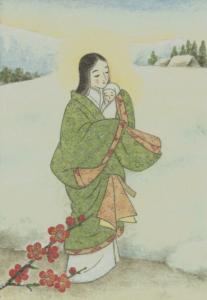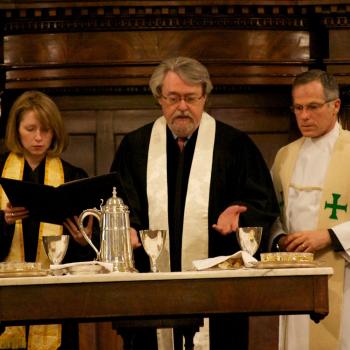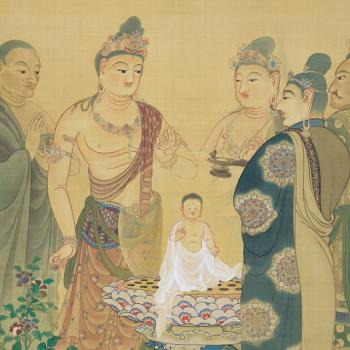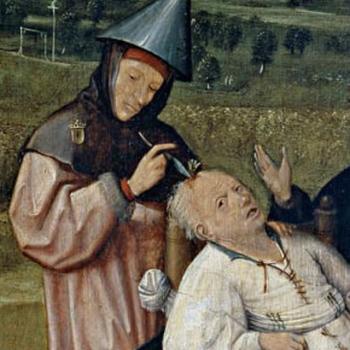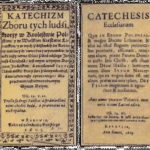As sometimes happens on Facebook I received a message inviting me to “like” a page. As it was from someone I admire, I went to the page to see if I could.
It was for a loosely organized group that practices a form of the Christian rosary. I looked around their website, found I had mixed feelings, but, somehow, and not entirely unconnected to my admiration for the creator of the page, I “liked” it.
The mixed feelings was how the beginnings of the group were based in some visions.
Visions are messy things.
On the one hand there are people like the fourteenth century Christian saint Julian of Norwich who while recovering from a serious illness experienced a series of sixteen visions. She wrote down her experiences and then kept working on the text for several years. This writings would eventually become the Revelations of Divine Love.
Beyond her writings we know almost nothing about her, not even her name. So, very much she becomes a what you see is what you get. Visions and all.
And there are other hands. My ordination master in the Zen way, some time after I left her, also during an illness also had a series of visions. In her case she saw a series of past lives. And out of this she re-oriented her community in some significant ways. While I have to admit I haven’t read them as closely as I did the Revelations, I did not see the potentials of wisdom in them that she clearly felt. But they affected a lot of people’s lives.
Now the standard response for a Zen person when confronted with visionary experiences is, “Don’t worry, they will pass.”
And they do pass. Sooner or later.
So, whatever power they may convey, that power needs to be held lightly.
Most problematically, I’m painfully aware of how many people who experience visions create idols of the truth they appear to experience. It is common to twist the realities our hearts can and do perceive.
Now. Often they contain some seed of what I have to call the real, I don’t want to use capitals here, but, we’re talking something profound, the call of our hearts, some genuine experience of depth. But most often these insights are too quickly interpreted through some misunderstanding of what happened, or some dogmatic assumptions, or, even more likely through some wound of the human heart that twists the original insight until it is almost or even completely lost. Too often I’ve heard reports from people where their interpretation and their certainty about it seems to lead to more sorrow than joy.
So, the caution. Don’t worry. It will pass. And. It will.
Also checking in with people who may have a wise word to say makes a lot of sense. Not assuming we’re necessarily the best arbiter of what we experienced may prove enormously helpful. Of course having such friends is itself a project. But, then, if you don’t, that raises more questions to dig into…
All that said.
The name we in Zen give visions is makyo. Makyo literally means a ghost or a devil cave. I’ve seen the term freely rendered as “diabolic interference.”
The assumption for us on the Zen way is at one with the bumper sticker that reads “don’t believe everything you think.” Actually, don’t believe anything you think. It never is the reality.
Our interpretation, our memory of what we experienced can be important. Is important. But, its always through a glass darkly. It is always recalled reflected in a funhouse mirror.
And.
And, these experiences can have truth about them. In fact they are true. Just as they present we find truth. Just this. Just this.
And.
This is my most important point. This is the hint I see in my friend’s visions and out of that the little group that has formed to practice it within a universalist context.
In my own spiritual quest I experienced a number of these visionary experiences, makyo, if you will. The one that most rises in my heart as I write this is how during an intensive Zen meditation retreat having a vision of Jesus walking toward me and saying, “I have a great gift for you.” My immediate thought was of my childhood Jesus, the one with all the children. And waves of gentle love washing over me. Then. He spreads his hands to reveal bleeding wounds. A terrible visceral fear leaps into my throat, as he then grasps my own hands with those bleeding hands. And, with that the pain of worlds birthing and dying ran from his wounds into what are now mine.
My hands hurt for weeks after…
And. I take it as makyo. And.
And. And, there is a very important part of my spiritual life that is informed by the hurt of the world that finds expression in that vision.
The truth of that vision lingers in my heart. To this moment.
And it is something that happened once in the past. And which is now a story, polished, and recalled. So, I don’t take it seriously. Well, I do. That’s not quite the right language. I take that vision deadly seriously. But, I also hold it lightly. I hold it as part of a world of experiences. It is part of who I am. And, in that part I see into something mysterious and true. But, I know it is also my reading, my experience, my vision; and only, ever, only a part of something more.
What it does more me more than anything is lead me into the ways of not knowing.
Just so, the woman we know as Julian had her visions. My old ordination master had hers. My friend had his. And, I’ve had mine.
For me there was a hurt in the world and through that hurt we can all find a way.
For my ordination masters, I’m less clear, other than how we all live in dreams, and our lives genuinely are many.
For my friend the call of the divine feminine expressed through a practice rooted in the deep soil of of the West.
For Julian there appear to be three things that emerged. One, maybe the most important was that there was a great love in the universe, something that appeared to be able to overcome even hell. Second she saw that sin was ignorance. And third her imagery of the divine, both God and Jesus was feminine. It seems to me each of these things takes Christianity to a new place, a more valuable and if you will, truer place.
In many ways her “all shall be well” reminds me of Yunmen Wenyan’s great koan “Every day is a good day.” Another line delivered in the midst of much hurt.
I find these true pointings. All of them.
The thing is if something like these revelations can be encountered “lightly,” not superficially, but held with open hands, broadly, pointing, informing but not inviting a closing down on it as the only truth, then we are truly invited into that mystery of not knowing. Even those hands grasping tightly as worlds birth and die must be held lightly. Not knowing. Only not knowing. The well that never dries up.
And with that a major practice point for all of us, whether on the Zen way, or any other path of depth. Experience what experience you are gifted with. Hold these things lightly, don’t crush the life out of them, hold them lightly. And then who knows what might be revealed.
In “Little Gidding,” the fourth of T. S. Eliot’s “Four Quartets,” he lifts two lines from Julian, “the ground of our beseeching,” and that all shall be well line, “…all shall be well, and all shall be well, and all manner of things shall be well.”
It seems to capture much of the spirit of divine vision that is useful.
An invitation to the open heart, the full heart, the heart that does not turn away, and what might be found in such a moment of naked presence…
Whatever we inherit from the fortunate
We have taken from the defeated
What they had to leave us – a symbol:
A symbol perfected in death.
And all shall be well and
All maner of things shall be well
By the purification of the motive
in the ground of our beseeching.
Vision.
Reality.
Pay attention. Grasp nothing. Hold all with open hands.
The way through…


